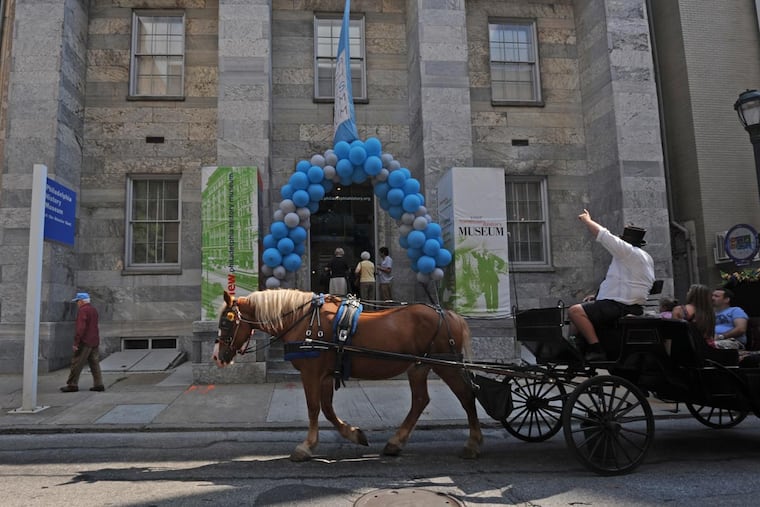Drexel is prepared to take charge of Philadelphia History Museum holdings
Plan for huge transfer of public collection to private university will see increased online and public access, officials say.

A plan to off-load management and responsibility for collection of the charter-mandated Philadelphia History Museum to Drexel University, which would evaluate the massive collection, place it online, and, ideally, farm artifacts out to as-yet undetermined locations around the city for exhibition, was greeted with general approbation at a public meeting Tuesday evening.
City and Drexel officials, speaking to about 100 gathered in Montgomery Auditorium of the Free Library of Philadelphia’s Central Branch, said Drexel would own the collection if Philadelphia Orphans’ Court approved the plan. The entire catalog — some 130,000 artifacts — would eventually be placed online and Drexel would work diligently to encourage collecting institutions, libraries, schools, historic houses, and similar organizations to borrow items for their own exhibits.
Rosalind Remer, Drexel’s vice provost and director of the Lenfest Center for Cultural Partnerships, said the idea is to get “more of the collection into communities.”
At the same time, she said that Drexel itself will “curate exhibits of the collection.”
“Drexel will be a significant location for exhibitions,” she said.
This was the second public meeting to address the plan, which was developed following last year’s closure of the museum in the midst of reduced city funding.
The entire collection of the museum -- from William Penn’s wampum belt to Joe Frazier’s boxing gloves -- is now in storage in East Falls and is undergoing evaluation and assessment supervised by Page Talbott, former head of the Historical Society of Pennsylvania.
At the first meeting on the plan, an overflow crowd at the National Constitution Center in February expressed considerable concern about the loss of a physical museum to showcase Philadelphia’s past.
Officials on Tuesday night addressed that concern indirectly by emphasizing that Drexel would indeed mount its own exhibitions. They noted that the former museum building, located in the original home of the Franklin Institute on South Seventh Street, could only display about 500 objects at a time, less than 1% of the collection.
Remer also said Drexel will seek to mount a traveling “trunk exhibition” that could go out to schools and other venues.
There has been concern expressed over the huge transfer of public assets from the city to a private organization, Remer noted.
The monetary value of the collection has not been determined. But considering that it includes paintings by Charles Willson Peale, Gilbert Stuart, and other American masters, as well as fine furniture such as George Washington’s presidential desk, the value is enormous.
Officials said that the city will retain the ability to petition for the return of the collection if it is not happy with Drexel’s stewardship. And Drexel, should it determine at some point that it wants out, may also petition to give it all back.
Paul Steinke, director of the Preservation Alliance of Greater Philadelphia, noted that one artifact not mentioned was the old museum building, a neoclassical affair designed in 1826 by John Haviland.
Kelly Lee, the city’s culture czar, said the disposition of the building, given to the city by radio pioneer Atwater Kent in the late 1930s, has not yet been addressed, adding that the city is very aware of the building’s historical importance. (Under terms of his gift, Atwater Kent’s heirs have the authority to demand the building’s return should it ever cease functioning as a museum.)
Lee said talks are ongoing with the Atwater Kent Foundation.
Steinke asked: “No McDonald’s?”
“No McDonald’s,” Lee responded.